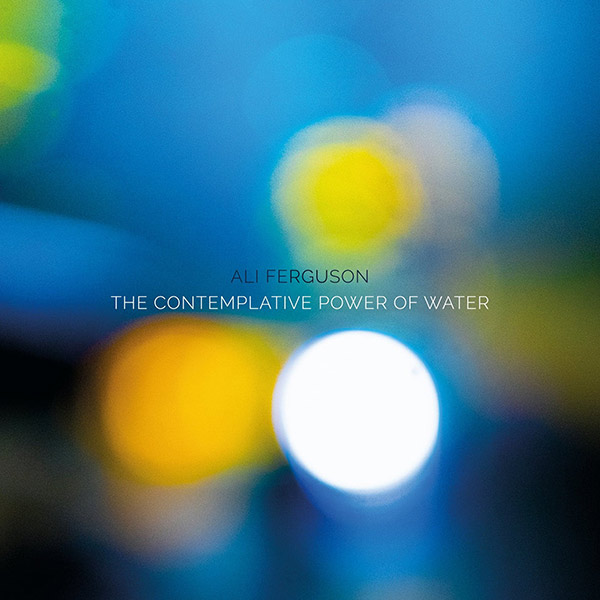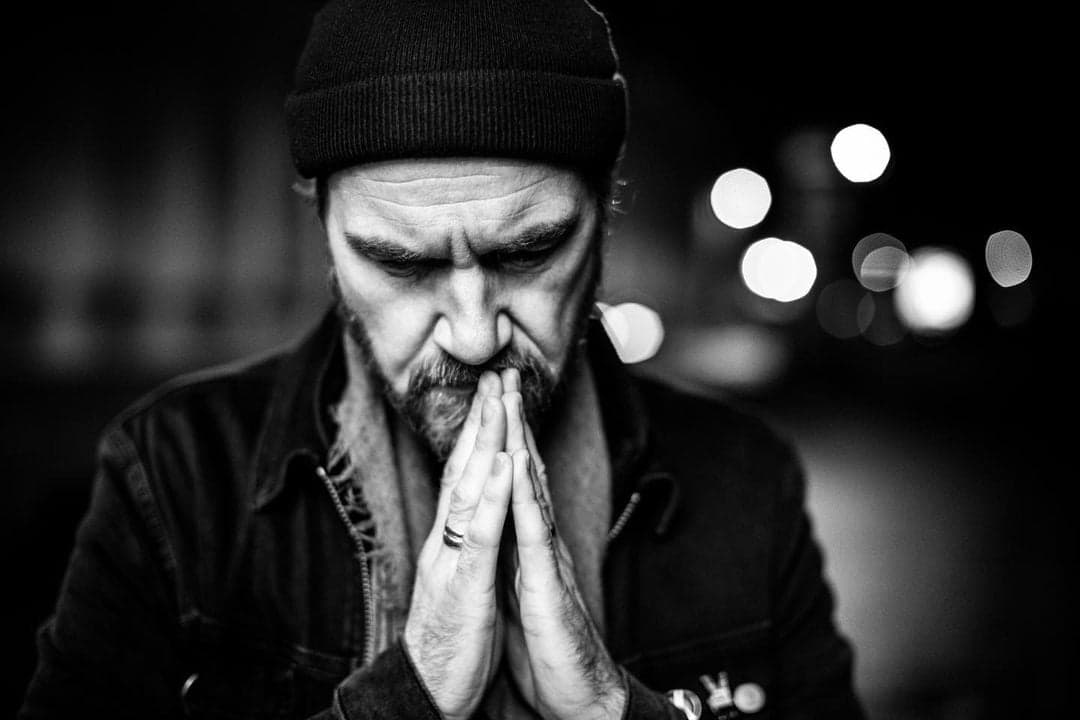- Article
- Read in 7 minutes
Ali Ferguson – The Contemplative Power Of Water – album review (2022)
With The Contemplative Power Of Water, Ali Ferguson, known from Ray Wilson’s live band, presents his third solo album. Ole Uhtenwoldt took a closer look.

Eleven years after his debut album The Windmills And The Stars and now six years after its follow-up A Sequence Of Moments, Ali Ferguson has released his third solo album. As a constant companion of Ray Wilson’s touring and studio band until 2020, Ali has made a big name for himself among Ray Wilson and Genesis fans; the new album, whose financing was supported by a crowdfunding campaign, was therefore eagerly awaited.
Of course, the last two years since the beginning of the Corona pandemic have not been easy for Ali either. Much of his time was spent touring with Ray and suddenly no more concerts could take place, uncertain how long this would last. Due to his own financial situation, Ali started working for an instrument shop to ensure a steady income. As concerts gradually became possible again, it was subsequently difficult to rejoin Ray’s live band, which had been established over the years. Since then, Ray’s brother Steve has taken over as lead guitarist at most concerts, while Ali (as well as bassist Lawrie MacMillan) is only on stage on rare occasions – when circumstances allow.
However, Ali’s creativity does not seem to have been negatively affected by this crazy time, because with The Contemplative Power Of Water he presents another remarkable album, in which he again relies on his meanwhile established trademarks, but also adds new aspects to them.
He has always expanded the line-up since his first album; so a few more names have to be mentioned in the making of this album again.
Besides Ali himself, who contributes vocals, of course guitar and keyboards, bass, programmed drums and various soundscapes, Chris Agnew (1 song) and Lawrie MacMillan (2 songs) again play bass, Liam Saunders again plays keys and Ali’s brother Duncan Ferguson strings. Kim Shepherd is back on backing vocals, as are Sally-Jo Seery and Karin Tenggren on one song each and Ross Ainslie provides the flute section. On the last song there is even a kind of family choir with Ali’s wife Jennie, his daughter Thea and his son Felix.
 With nine tracks, the album has a total playing time of about 68 minutes. The length was already an issue with the previous album, which would certainly have been a good one also with less playing time. With the new album, however, you have the feeling that every minute is necessary to achieve exactly what Ali wants to achieve; he takes the time he thinks is necessary. And his special kind of “ambient prog” often needs a while to unfold. In fact, a track like this goes by surprisingly quickly when you listen to it.
With nine tracks, the album has a total playing time of about 68 minutes. The length was already an issue with the previous album, which would certainly have been a good one also with less playing time. With the new album, however, you have the feeling that every minute is necessary to achieve exactly what Ali wants to achieve; he takes the time he thinks is necessary. And his special kind of “ambient prog” often needs a while to unfold. In fact, a track like this goes by surprisingly quickly when you listen to it.
The centrepiece of the album is certainly the three-part title track, a kind of ambient epic, which is divided into the beginning, middle and end of the album. Lyrically, the whole album is somewhat abstract about themes such as self-discovery, hope, transience and the path to inner peace. Ali has assigned a particular quote to each track and the last one sets a poem to music. But one after the other:
The Contemplative Power Of Water (Pt.1)
The opener begins as Ali has become accustomed to: slowly building up. A summer thunderstorm with temperature announcements from a radio announcer leads into lyrics spoken by Ali, which serve as an intro to a longer instrumental section. This starts with spherical guitars before it leads into a rhythm of acoustic guitars, electronic samples, percussion and drums. It’s an excellent start that shows where the album is heading. With its retro touch, the track even sounds a little like the early phase of Porcupine Tree (Up the Downstair to Signify). The first part of the Water-suite flows along powerfully and subsides relatively quickly at the end. It gives the impression that The Windmills and the Stars was just a fortnight ago and A Sequence of Momentswas one – and that is meant quite positively!
Children Of Men
Next we hear suppressed noises that sound like being underwater. After a key turns and a door opens, we find ourselves in a soundscape somewhere between ancient coliseum and modern stadium; it’s quite interesting how Ali juggles different soundscapes! Children of Men, with its loose, upbeat rhythm, could pass as a sort of follow-up to Flickering Golden from the first album, and sounds playfully funky. Although the verses are densely orchestrated, they are dominated by Ali’s characteristic, lightly breathed vocals. Towards the end, he shows a short, dashing guitar solo, before the door from the beginning closes again and leaves us with a Morse code – an element that we will encounter more often in the course of the record.
The River Crows
We dive into the next setting: Morse code takes us on a canoe trip through nature. Fittingly, the track is initially characterised by plucked acoustic guitars and Duncan’s strings. The track was previously promoted with a video and takes a folk direction. The second part is initially dominated by Ross Ainslie’s flutes, which then solo together with Ali’s electric guitar. A choir takes up the theme, increases in density and swells again until only Karin Tenggren’s voice remains, finally leaving us with the “singing” of crows and the Morse code from the beginning. Certainly a well-placed, quiet interlude at this point!
Stare Into Sunlight (Release / Control)
The following track initially comes along in a straight tempo with a poppy guise. The chorus then captivates with the chord progression and harder guitars in the background with a certain dramaturgy and in the post chorus Ali surprises us with squeaky synth keys. The final third features a dynamic guitar solo and the bass played by Lawrie is definitely a plus! This track is one of those that sounds a bit newer and so maybe wouldn’t have fit directly on one of Ali’s earlier albums.
The Contemplative Power Of Water (Pt.II)
The second part of the Water-Suite is completely instrumental and begins with a natural backdrop, a water jump and floody guitars. This track differs somewhat from Ali’s other instrumentals, is less bombastic than, for example, “Hidden Instruments”, less guitar-heavy and, with its alienated percussion and electronic elements, is more reminiscent of one or another of Peter Gabriel’s sound experiments in mood and approach. After a longer outro, the track leads into…
 The Catacombs
The Catacombs
…which initially gives a more song-oriented impression and sounds restrained in the verses, which are refined by piano and Ali’s guitar. The chorus joins the harmonic basic mood before Ali then suddenly surprises us with a 90s electro insertion – what a twist! After that, he lets his guitar continue to tell the story, which picks up speed while being underpinned by a rock organ and finally finds its way to a calm conclusion. The Catacombsis a highlight through its whole dramaturgy and reminds a bit of In Morning Sky from the debut album.
You Can’t Hold An Ocean
The following track is the shortest on the album and thus also the most compact. A little more unobtrusive overall, the verses show a suitably staged fragility. The second verse offers beautiful background vocals and versatile accents through Ali’s guitar. Just when you have adjusted to the mood, the track comes to a rocking outburst and gets loud once more. This song is also one of the moments that wouldn’t have really fit on the previous albums.
Peace Begins With Me
The penultimate track sounds a bit like a continuation of the predecessor, both in terms of mood, chords and melody. Overall, Peace Begins With Me is perhaps the most accessible track on the album, but leads into a polyphonic solo with doubled guitars before the finale.
The Contemplative Power Of Water (Pt.III)
The longest track on the album, over 10 minutes, first takes us to a rainforest shore at night before Ali’s typical ambient guitars join in. The vocal part that follows, using Ali’s family as a choir, shows a clear world music touch that builds up and creates the image of a jungle. The third part of the suite is again designed as a sound collage, sounds partly improvised and thus has a lot of “space”. Finally, Ali’s chanting sets the poem Poem by the American poet Sara Teasdale to music, before an almost indigenous-sounding chorus introduces the end of the track. The last minute is then reserved for the titular sound of water, in conjunction with the Morse code still buzzing around. With its fading out, the album ends.
The album fits neatly into Ali’s previous discography and shows once again what an excellent guitarist he is. He has found his style and this gives the album an honest authenticity that you can feel throughout the whole album. He manages to add more elements to the often underlying ambient mood and link it with other genres…perhaps even better than on his previous albums. So it can definitely be seen as progress, Ali does not stagnate. Of course, one can debate to what extent a real drummer replacing the programmed drums would have helped the album; but the fact is that Ali’s drums and percussion are always orchestrated to suit the song, and the stage is rather left to Ali’s solo interludes or soundscapes. Ali has presented an album that is in no way inferior to its predecessors!
Author: Ole Uhtenwoldt
The Contemplative Power Of Water is available on CD and in digital format via Bandcamp.
